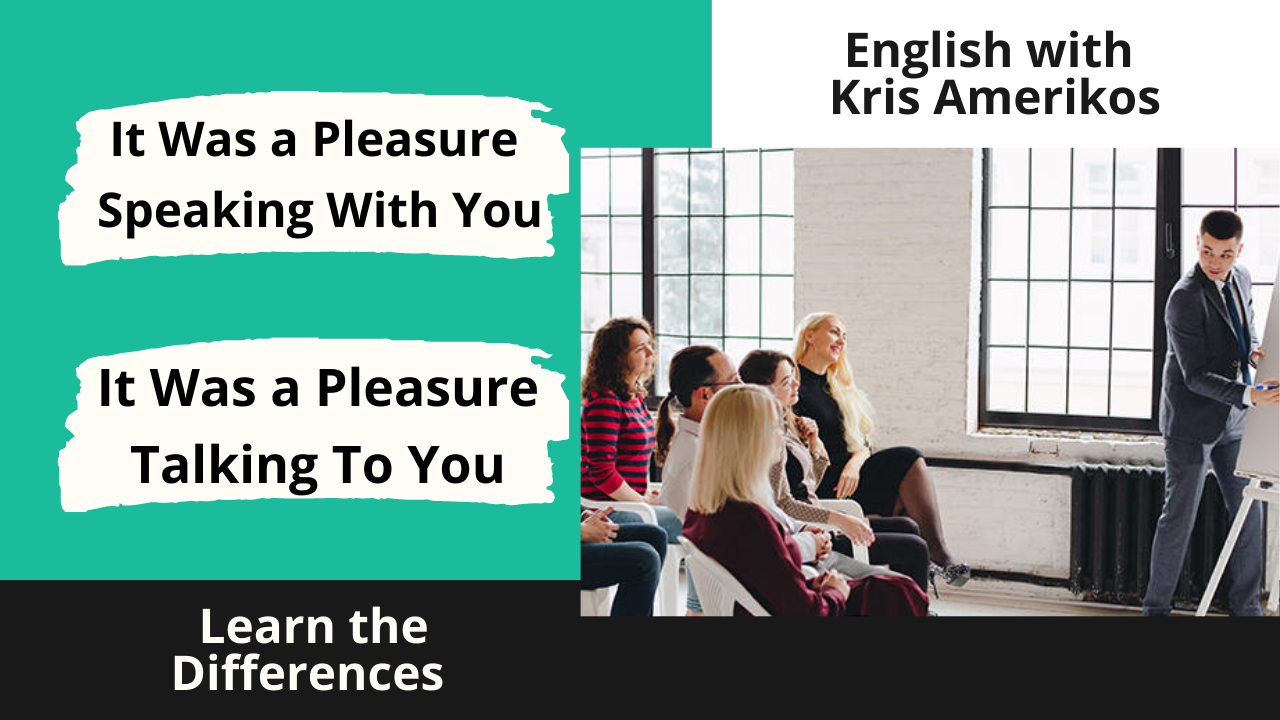It Was a Pleasure Speaking With You and It Was a Pleasure Talking To You - Learn the Differences

 “It was a pleasure speaking with you” and “it was a pleasure talking to you” are two polite phrases that you may hear native English speakers say at the end of a conversation.
“It was a pleasure speaking with you” and “it was a pleasure talking to you” are two polite phrases that you may hear native English speakers say at the end of a conversation.
In English, there are many ways to politely end a conversation. These two phrases are just two examples of friendly and polite ways to close and wrap up a conversation. We can use them to show our appreciation for the other person’s time and attention.
What Are The Differences Between It Was a Pleasure Speaking With You and It Was a Pleasure Talking To You
“It was a pleasure speaking with you” and “it was a pleasure talking to you” have the same meaning. We can use them interchangeably. ‘With’ is a better preposition to use when we want to express a two-way conversation. ‘To’ implies that the conversation may have been one-sided.
It Was a Pleasure Speaking With You
“It was a pleasure speaking with you” means that I enjoyed engaging in a two-way conversation with you. The conversation was enjoyable and it was a nice discussion.
‘Pleasure’ means something that gives happiness, satisfaction, and enjoyment. In this case, it was a two-way conversation that evoked these emotions.
We can also say “it was a pleasure talking with you.” This has the exact same meaning as “it was a pleasure speaking with you.”
Examples:
“I must leave. It was a pleasure speaking with you. I hope to see you again soon.”
“It was a pleasure speaking with you. Thank you. Bye.”
“It was a pleasure talking with you. I hope we can meet up again soon.”
It Was a Pleasure Talking To You
“It was a pleasure talking to you” is a perfectly acceptable alternative for “it was a pleasure speaking with you.” The nuance in meaning is so subtle that the person whom you say it to won’t notice the difference.
However, we use the preposition ‘to’ to show a direction. When we say “it was a pleasure talking to you,” we are highlighting that the act of the speaker talking to the other person was enjoyable. This sentence is usually more acceptable at the end of a speech - because a speech is a one-sided conversation.
However, the difference between ‘with’ and ‘to’ is not very important. Native English speakers use either one to mean “I enjoyed our conversation”. The difference is irrelevant.
We can also say “it was a pleasure speaking to you.” This has the exact same meaning as “it was a pleasure talking to you.”
Examples:
“Thanks for the talk. It was a pleasure talking to you.”
“Thank you for listening to me. It was a pleasure speaking to you.”
“Goodbye. It was a pleasure talking to you.”
What is English Everyday
English-Everyday is an English course with live lessons for English learners who want to improve their English with native speakers, professional teachers, and students from around the world.
You have live lessons where you can join every day. You can review all record lessons. There is a calendar of scheduled lessons so you can see when lessons are and at what time you can join.
In English Everyday program, you have support and also you have student chat where you can speak with other students from all around the world. You can look at our feedback page so that you can know from which countries our students are. Before you join our program, we strongly recommend you sign up for our free seminar with Kris Amerikos, where you can learn:
- What goals you need to have to get better results
- How to become fluent in English very quickly
- What you need to do to have perfect pronunciation
- The 3 biggest mistakes you need to avoid
- Which free resources will help you learn English
- The best resource to use to improve your speaking
What To Say Instead Of It Was A Pleasure Speaking With You?
“It was nice talking to you,” “it was great to talk to you,” “it was a pleasure meeting you,” “it was nice to meet you,” and “it was good talking to you,” can all replace “it was a pleasure speaking with you.”
How Do You Write Pleasure Talking To You?
“It was a pleasure talking to you” is more informal than “it was a pleasure speaking with you.” In formal writing and speech, the latter would be more appropriate. In day-to-day conversation, it’s more common to say “it was a pleasure talking to you.”
How Do You Respond To It Was a Pleasure Talking With You?
“Thank you! And you too,” is the best way to respond to “it was a pleasure talking with you.” We say “thank you” because the person speaking to us is being polite and kind. It would be rude not to accept the compliment. We can shorten ‘thank you’ to ‘thanks’ in informal situations.
“And you too” is short for “it was a pleasure talking with you too.” It is the best short response to “it was a pleasure talking with you.”
It Was a Pleasure Speaking With You Today
“It was a pleasure speaking with you today” is a great way to end a speech. It is a very formal and strong ending line that wraps up a speech and lets everyone know that you have finished speaking.
Example:
“Thank you for your time. It was a pleasure speaking with you today.”
This is a fantastic way to politely end a long conversation or a long speech. It’s polite and works as a social cue that means “I am officially finished talking.”








































